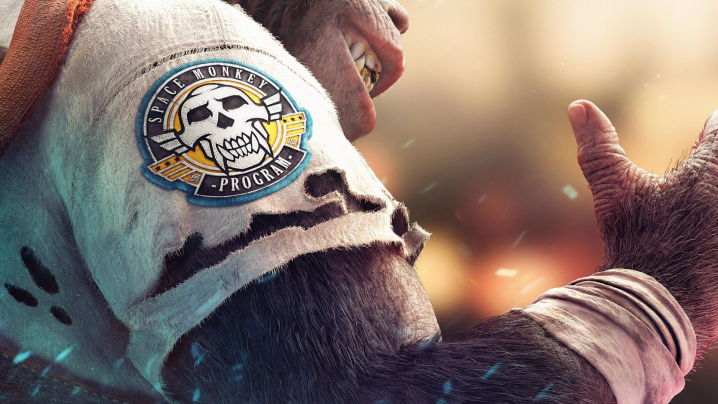
At its E3 2018 press conference, Ubisoft announced it will use a tried-and-true tactic to supplement the development of one of its games: Get the community to make stuff.
On Monday, after showing a lengthy story trailer for Beyond Good and Evil 2, the publisher brought out film actor and director Joseph Gordon-Levitt, the founder of HitRecord, a production company that’s all about getting people online to collaborate on projects. Part of Beyond Good and Evil 2‘s development will outsource some design elements, including songs and billboard art assets, to community creators who want to be a part of the project. HitRecord is facilitating that arrangement.
On its face (and before digging into the potential issues and complications), it’s a fascinating initiative. It lets Ubisoft involve fans in the creation of a game; it builds community around that game long before it’s ever released; and it (presumably) takes pressure off developers who would otherwise have to create that stuff to fill in the gaps to make Beyond‘s world more robust.
Part of Beyond Good and Evil 2‘s development will outsource elements to community creators.
It should be noted, too, that this isn’t just Ubisoft vacuuming up a bunch of free work — or at least, that’s the official line. HitRecord already has a structure in place for paying contributors to the stuff it creates, and it’s doing the same thing with Beyond. The two companies have set aside $50,000 for the art and music part of the project, and floated that they’re open to setting aside more if the program is a success.
There’s a cynical take to be made about the idea of huge video game publishers with tons of money outsourcing their work to players, of course, and $50,000 does not seem like a lot of money, relative to what Ubisoft would spend on professional artists. It’s a move that potentially takes jobs from professionals, while potentially low-balling community members with starry eyed dreams of being a part of the games industry, becoming professionals themselves, or both.

There’s another way to look at Ubisoft’s collaborative approach to Beyond Good and Evil 2, though — that it might provide an innovative way to drive interest to a substantial sequel of a cult classic game, like a natural evolution of crowdfunding. In fact, in a world where more and more huge corporations are turning their eyes towards service-based, “live” games — something you play continually, regularly paying for content — collaboration with players and creators may be a way to keep those games from stagnating.
Skyrim has enjoyed a ludicrously long life, and the role of modding in sustaining it can’t be overstated.
It’s not like we don’t have a precedent here. The PC game modding community has existed as long as games have, and the stories of how the excitement and creativity of fans has changed games for the better are too numerous to count. For an easy example, take The Elder Scrolls V: Skyrim, a game publisher Bethesda opened up to the modding community in full. The things the community has created range from the absurd, like replacing all the game’s dragons with Thomas the Tank Engine, to the earnest and enormous, like new full player-created stories and quests. Bethesda also created a system to pay content creators, called Creation Club, while maintaining its giant free modding community. Skyrim has enjoyed a ludicrously long life, and the role of modding in sustaining it can’t be overstated.
So instead of a content collaboration being a cynical move by a big corporation looking to exploit fans’ devotion, there’s a chance that it could be a positive, exciting attempt to build a community around a game, keeping that community engaged, and expanding that game’s possibilities. That’s especially true in a world where the games-as-a-service concept is increasingly creeping into more and more things. Loot boxes, free-to-play models, persistent worlds with new content drops over time — they’re all angled at getting you to buy fewer games, play them longer, and ultimately pay more for them.

Perhaps, though, the sustaining element that makes games-as-a-service worth it for all involved is a greater potential for creation and collaboration among players, rather than just consumption. That seems to be the direction Media Molecule is thinking in with Dreams, it’s extremely robust creation tool-slash-video game. Dreams is first and foremost an easy to use kit for making games, or pieces of games, and sharing them with other people who are also making games or pieces of games. If you want to just hang out and play other people’s creations, you can, but what makes Dreams exciting is the possibilities it offers to creators. From full-on game designers to musicians, artists and writers, Dreams is about creating a network of collaboration to make stuff. It’s not one where people will get paid, at least not right now, but the possibilities of what players can create together, and the accessibility Dreams‘ easy tools offer, is exciting.
Sticking with a game because it has community content is way more appealing than because of its monetization strategy.
Ubisoft’s partnership with HitRecord feels like it could go in a similar direction, offering new chances for new people to create new things. It’s possible that opportunity will turn out to be exploitative, or poorly planned, and fail. Still, the idea of playing one game long into the future because it has a robust, interested community creating content is way more appealing than continuing to play a game because its monetization strategy incentivizes things like pseudo-gambling and slow-drip fun. If games can find a way to make collaborating with creators and players fair as well as exciting and fun, it could make games-as-a-service stop sounding like a dirty word.


